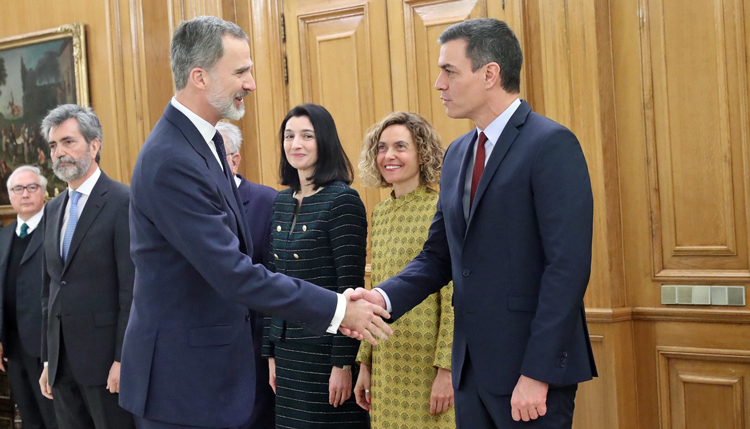Ángel Collado
With Alberto Núñez Feijóo’s investiture rejected in Congress by four votes, Pedro Sánchez will appear before the King tomorrow to postulate himself as a candidate for a second attempt while he negotiates the 19 votes of the nationalist and pro-independence parties that he lacks to be re-elected President of the Government. The PSOE candidate, second in July’s general elections, takes it for granted that he will receive Felipe VI’s commission, even if the price of his support means auctioning off the constitutional framework.
Between today and tomorrow, the Monarch will receive the representatives of the political groups with parliamentary representation, in order from smallest to largest, to fulfil his obligations in the procedures for the Congress to be able to invest a president of the Government. The King has to propose a candidate, through the Speaker of the House, once the parties have been consulted. The Constitution does not establish the criteria to be followed in the brief article 99 on the investiture process.
In Feijóo’s case, Don Felipe based his decision on the tradition that he was the candidate of the party with the most votes in the elections, and that there was no other candidate who had more than the 172 votes that the PP president had at the time, on 23 August, the 137 of his own plus the 33 of Vox and two regionalists. Sánchez also put himself forward at that time despite the fact that he did not have more explicit support than that of the PSOE, Sumar and Bildu (the heir to ETA’s political wing): 158 seats in total.
The socialist leader took it for granted that he had a majority to carry through his investiture, but his separatist partners, the regulars of the last legislature and the new ones like Puigdemont’s party, refused to comply with their constitutional obligation to go to the King’s consultation and began to put a price on their votes: impunity in the courts and self-determination.
Sánchez said he accepted the King’s decision in proposing Feijóo, but then campaigned for a month against the investiture attempt, to the extent of boycotting the parliamentary session and avoiding his participation in it as the PSOE’s top representative.
The two Catalan separatist parties, ERC and Junts with their 14 seats, have already proclaimed as accepted by Sánchez the demand for an amnesty law that will annul the legal cases and crimes committed by their leaders, militants and activists in the attempted secession of 1 October 2017. Having achieved this starting point, which the incumbent government and the PSOE dare not deny, they are now determined to get the Socialist candidate to also commit to clearing the way with the next step: a referendum for the secession of Catalonia.
The revelations about the pacts and concessions underway have not gone down well with the Sanchista leadership, which preferred to dose and soften on its own the dissemination of the content of its commitments with Carles Puigdemont, the former president of the Generalitat and fugitive from justice so as not to answer for his crimes in Spain and who, with his 7 deputies in Congress, holds the key to the PSOE’s continued presence in power.
For the moment, and in order to gain time, socialist spokesmen are limiting themselves to repeating that there will be no referendum and avoiding any comment on the content of the “penal relief” project, which is what they call it in the governmental media, that they are outlining with the leader of the coup.
Sanchismo’s political and propaganda apparatus is preparing a major offensive to present this amnesty law as the decisive formula for achieving the “pacification of Catalonia”, a milestone they took for granted in the last legislature with their concessions to ERC: pardons for convicted and imprisoned coup leaders, suppression of the crime of secession and a reduction in the crime of embezzlement.
As the socialist leader now needs the votes of Junts, Puigdemont’s party, he has to give another turn to “pacification”, also giving in on the general annulment of all the consequences of the coup before the courts and promoting judicial impunity for the separatists involved.
For the pro-independence supporters, this piece is decisive for forcing a referendum on self-determination that would liquidate Spain’s national unity. From the outset, the amnesty, with this name or whatever euphemism it may be called, includes the amendment to the self-defence of the constitutional order that the state made in the face of the secessionist coup of 1 October 2017.
With the amnesty that Sánchez is willing to promote, the work of the Parliament (the Senate that intervened in the powers of the Generalitat), that of the Government of the time that restored order and law in Catalonia with the unconditional support of the opposition of the time (the PSOE with Pedro Sánchez himself at the head), that of the judges who tried and convicted the coup perpetrators, and that of the King himself who intervened in the crisis to call for the defence of the constitutional order, will be disavowed.
Sánchez goes to the Monarch’s consultations tomorrow with the same committed support he had in August plus the concessions he is negotiating with Puigdemont and does not want to count on, all against the King’s defence of the Constitution on 1 October 2017, and without Don Felipe having any more room for manoeuvre than to propose him as a candidate for the presidency of the Government.







